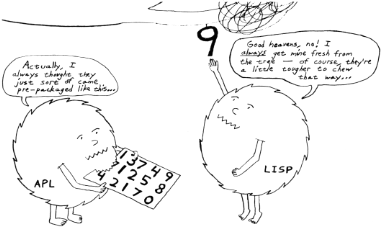LISP
n.
[from ‘LISt Processing language’, but mythically from ‘Lots of Irritating Superfluous Parentheses’] AI’s mother tongue, a language based on the ideas of (a) variable-length lists and trees as fundamental data types, and (b) the interpretation of code as data and vice-versa. Invented by John McCarthy at MIT in the late 1950s, it is actually older than any other HLL still in use except FORTRAN. Accordingly, it has undergone considerable adaptive radiation over the years; modern variants are quite different in detail from the original LISP 1.5. The dominant HLL among hackers until the early 1980s, LISP has since shared the throne with C. Its partisans claim it is the only language that is truly beautiful. See languages of choice.
All LISP functions and programs are expressions that return values; this, together with the high memory utilization of LISPs, gave rise to Alan Perlis’s famous quip (itself a take on an Oscar Wilde quote) that “LISP programmers know the value of everything and the cost of nothing”.
One significant application for LISP has been as a proof by example that most newer languages, such as COBOL and Ada, are full of unnecessary crocks. When the Right Thing has already been done once, there is no justification for bogosity in newer languages.

We’ve got your numbers….